After Opportunity Hub closure, what shelter options are still available in Spartanburg?
With the closure of the Spartanburg Opportunity Center in April, the city’s homeless population has one less option for shelter, turning more focus to remaining resources.
The permanent closure was attributed to a loss of support and funding and came half a year after the center’s night shelter was shuttered last October. City officials on multiple occasions stated the night shelter was never designed as a long-term fixture.
Still, the Upstate contains 35% of the state’s homeless population – 1,263 individuals – according to Point-in-Time data collected by the U.S. Department of Housing and Urban Development in 2022.
Beth Rutherford, homeless engagement specialist for the city, worked for almost 15 years at the Opportunity Hub, the umbrella nonprofit which oversaw the Opportunity Center, under its former name, Spartanburg Interfaith Hospitality Network.
Rutherford first moved to Spartanburg in 2005. She said the loss of the Opportunity Center is the only change to homeless shelter options since then. The three remaining shelters are Miracle Hill Rescue Mission, The Haven and Divinity Cares.
What led to Spartanburg Opportunity Center permanent closure?
Susan Ballantyne, former president of the Opportunity Hub, previously told the Herald-Journal that a loss of funding from “major players” contributed to the Opportunity Center’s permanent closure in April.
In October 2022, the night shelter was closed by city officials who said it was only meant to be temporary.
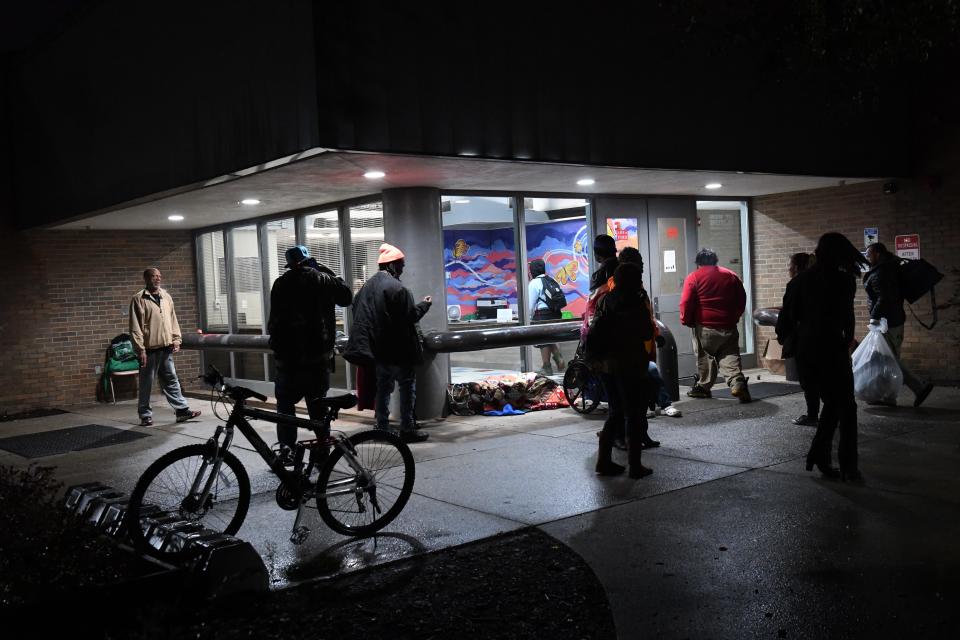
Rutherford, who worked at the Opportunity Center as executive director from June 2007 to February 2022, said the night shelter served as a short-term solution during the height of the COVID-19 pandemic. The additional space was used to accommodate social distancing concerns at Miracle Hill Rescue Mission, the largest of the three shelters operating within city limits.
“Miracle Hill was always the cold weather shelter place. When COVID hit, they had to social distance,” Rutherford said. “That's when we were asked if the Opportunity Center could do a cold weather shelter as well.”
Rutheford said the center eventually was averaging about 38 individuals a night and that the dynamic of the two shelters worked well.
However, staffing and security costs made the upkeep of the night shelter difficult, she said.
Jim Hames, Stewardship Coordinator for Miracle Hill Spartanburg, acknowledged the closure came at “the worst possible time.” Hames said on one occasion after the Opportunity Center closed, he observed Miracle Hill’s hallways full of people using the overnight facilities.
HUD’s PIT data, which measures the homeless population on one given night out of a year, showed the Upstate contained 35% of the state’s homeless population in 2022. Rutherford is the lead coordinator on the count for Spartanburg, Cherokee and Union counties.
According to 2023 PIT data, Spartanburg County was second only to Greenville County in the Upstate, with 162 individuals reported in emergency shelter, 25 in transitional housing and 45 determined unsheltered.
Rutherford said these numbers vastly underestimate the actual count of homeless individuals, and that gathering data on a transient population can be difficult.
The Opportunity Hub continues to provide housing services with a grant from HUD’s rapid rehousing program, according to Rutherford. The services are available until November and then funding will be redirected to another local agency.
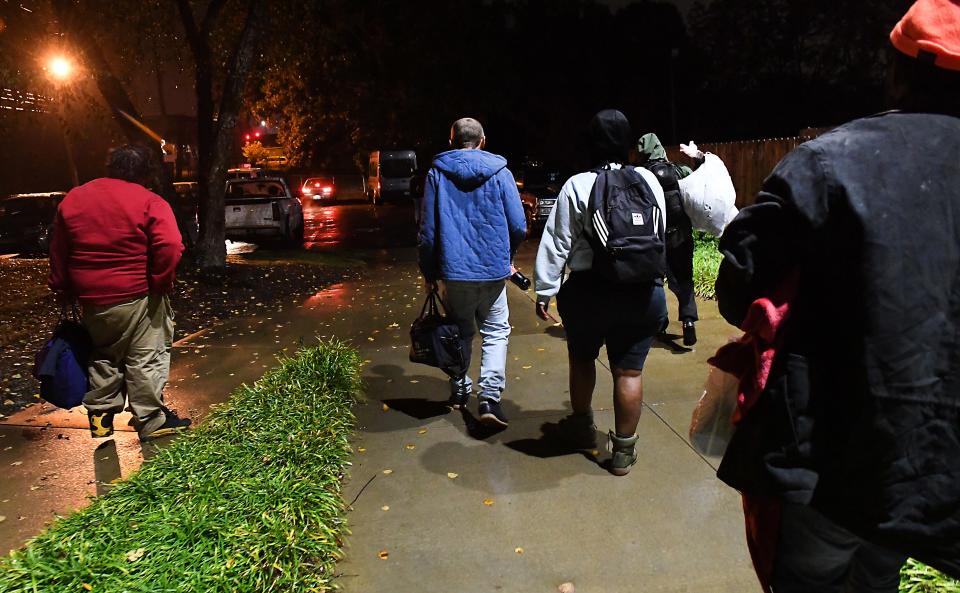
What shelter options are available in the city of Spartanburg?
Miracle Hill Rescue Mission
The Miracle Hill Spartanburg shelter, located at 189 N. Forest St., offers 94 beds in dormitory-style housing – 66 for men and 28 for women. Men and women are housed in separate sides of the shelter, while girls up to 18 and boys up to 10 can stay with their mothers.
Director Roy Williams, told the Herald-Journal the shelter has a 30-day Crisis Shelter Prevention program that provides immediate shelter and stability and a 90-day New Life program that provides longer-term support focused on transitioning individuals “from homelessness to housing.”
Williams said residents are “encouraged” to attend daily chapel services offered at the shelter. Crisis Shelter Prevention participants who attend chapel are eligible for the New Life program.
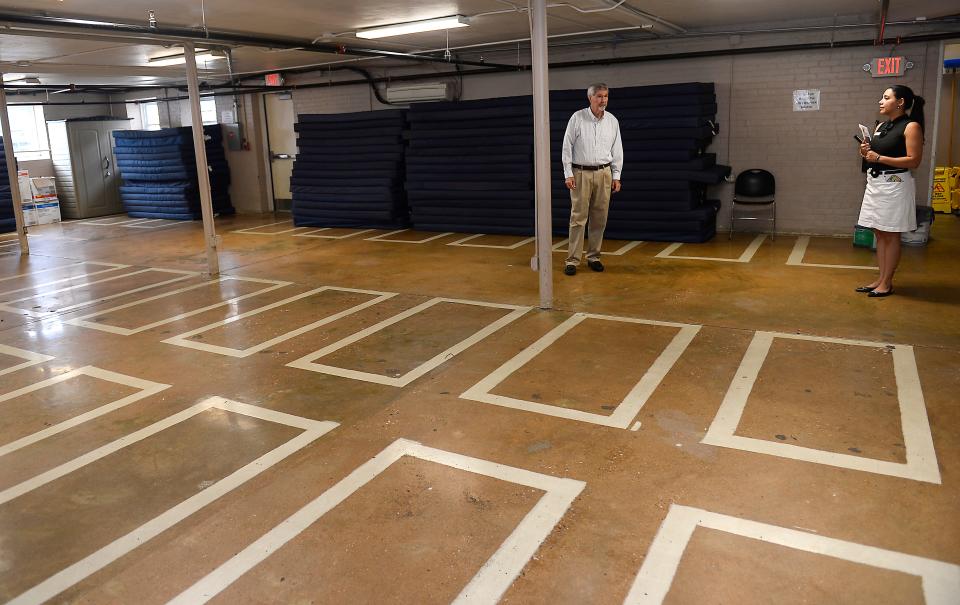
“We do not force anyone to go [to worship services] - if a person wants to do it, they do it,” Yolanda Campusano-Pilarte, communications and public relations officer for Miracle Hill, said. “It is very important for us to teach them responsibility, it is important for us to teach them accountability.”
A $60 weekly program fee is required for employed residents. However, Williams and Campusano-Pilarte, said that no one is turned away if they are unable to pay the fee. The fee covers three meals a day, residence and facilities in the shelter and case management, they said.
Case management includes counseling sessions, job-seeking assistance and help accessing financial and medical aid.
If residents cannot afford the fee, there is an expectation to work or help around the shelter.
Williams said the only requirement to stay at the shelter is to pass a breathalyzer test. Campusano-Pilarte added that this is for the safety of staff and other residents.
“Homelessness is just a symptom of a root problem, and sometimes that is addiction, sometimes that is brokenness and trauma,” Campusano-Pilarte said. “We don't want to be triggering anyone that is in their 100% into recovery, and the first step is to find shelter and stability.”
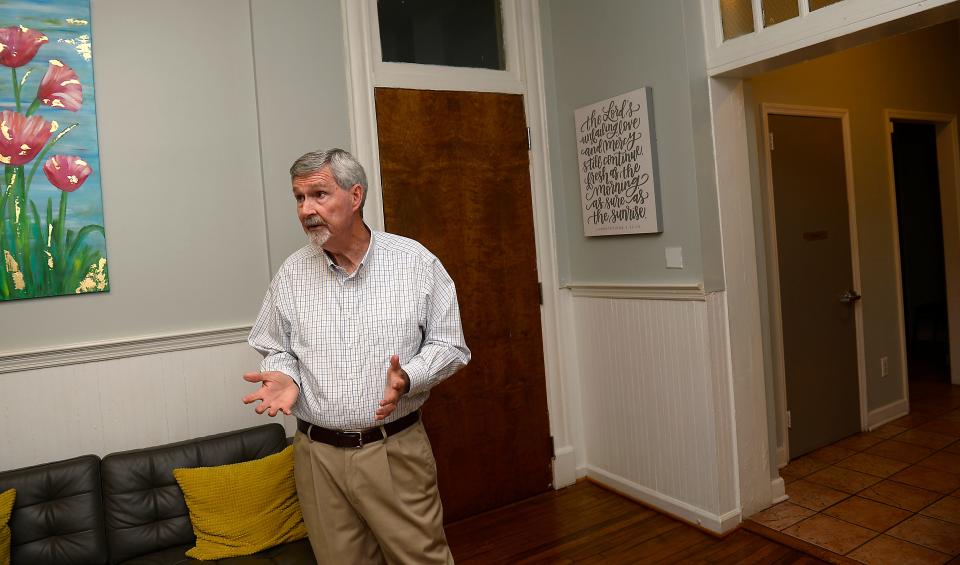
If someone leaves the Crisis Shelter Prevention program, voluntarily or involuntarily, there is a 60-day waiting period before they are eligible to come back. The waiting period for readmittance into the New Life Program is quicker at ten days.
The Spartanburg shelter has mattresses and overflow space in both the basement and the chapel in cases of extreme weather.
Miracle Hill also offers transitional housing options across the Upstate. To be eligible, an applicant must have successfully completed their time in a Miracle Hill shelter or have graduated from one of the recovery programs. They must also be employed or ready to enter the workforce, stay in contact with a volunteer mentor and avoid further substance issues.
Divinity Cares
Divinity Cares is a males-only shelter at 446 Arch St. which can host up to 17 residents. Founder and director, Rev. Richard Johnson, said the agency accepts all individuals, including those with certain criminal charges that may preclude them from other shelters.
“Most of the guys we have, they’re not eligible in other facilities,” Johnson said.
Johnson said staff help residents establish employment.
“We try to assist them in any way we can to get a job and become an asset to society because most of them got capabilities and things of that sort,” Timothy Marshall, board chairman for Divinity Cares, said.
During a tour of the facilities, Johnson said that six residents were currently housed there. During cold weather, Johnson said the facility has additional cots for overflow if needed.
The facility has a policy that prohibits the use of alcohol and other illicit substances. However, Johnson said the shelter only requires drug or breathalyzer tests if rules, such as curfew, are broken. Marshall said they arrange Narcotics Anonymous and Alcoholics Anonymous attendance for residents who need it.
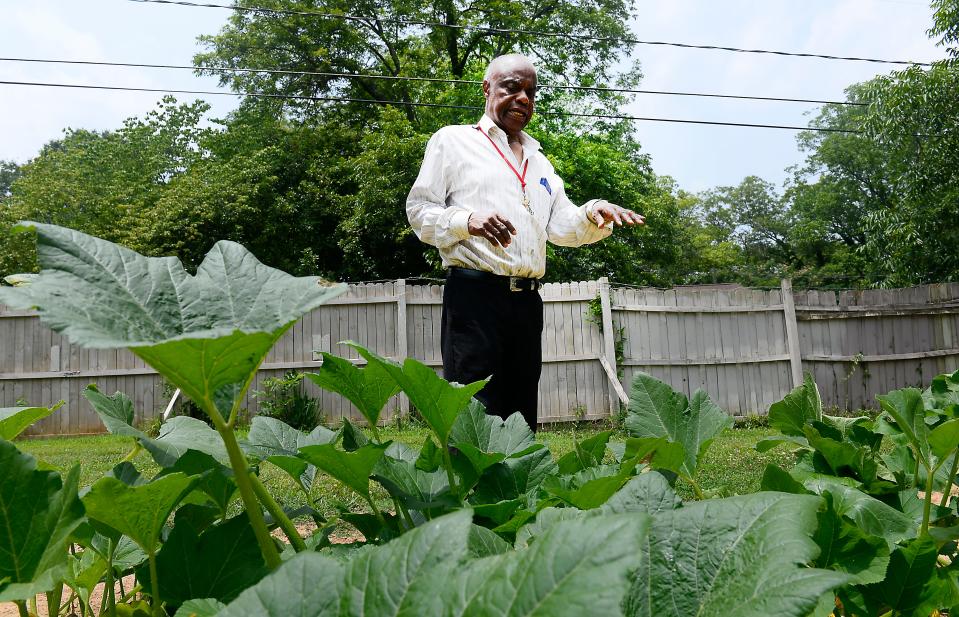
Johnson began renovation of the house in 1996. Born and raised in Atlanta, he had multiple run-ins with the justice system before founding Divinity Cares.
In 1992, a few years after his last prison sentence, he moved from Atlanta to Spartanburg. Though reluctant to move at first, he eventually found his life purpose through his Christian faith and helping those who are dealing with issues he once faced.
“I was tired of going back to prison,” Johnson said.
Intake hours are only during the day. However, Johnson hopes that by raising enough money to hire a night counselor and case manager, they can expand the shelter’s services.
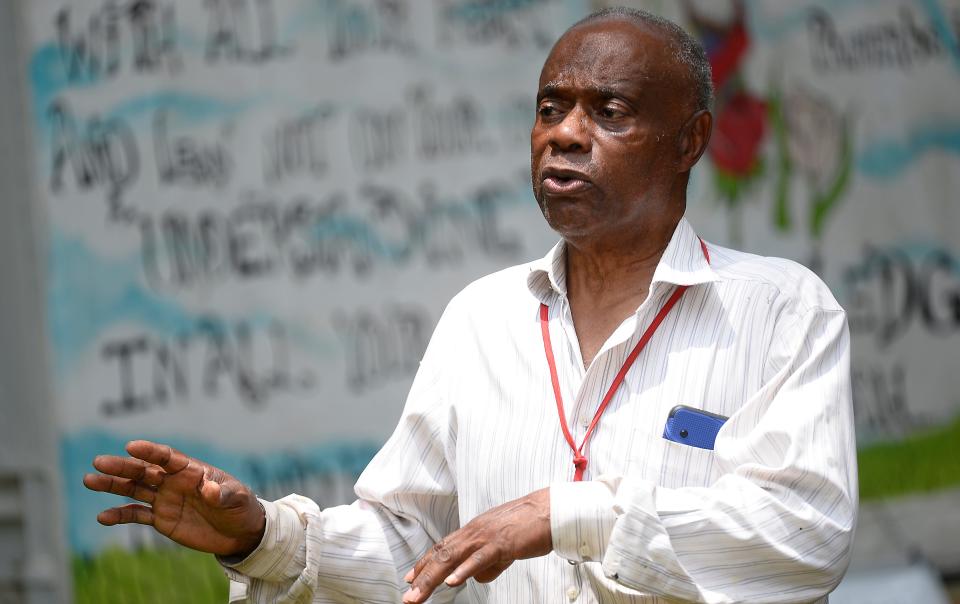
The Haven Community Solutions
The Haven Community Solutions is a nonprofit that uses offsite hotel rooms and exclusively shelters families. The program can house four families at a time and their administrative offices are located at 852 E. Main St.
Kelly Schlossin, executive director of The Haven, told the Herald-Journal the agency provides three different programs, which all include a degree of case management.
The Emergency Shelter program for families offers hotel residence and support services such as providing food, clothing and household items.
The Homelessness Prevention program provides in-home case management and financial assistance to families and individuals at risk for homelessness.
The Street Outreach program also offers on-the-street case management, as well as vital necessities and resource coordination for individuals residing in a place unfit to live.
Family homelessness presents itself uniquely, both Schlossin and Rutherford said.
“You don’t see family homelessness like you see individual homelessness,” Rutherford said. “The families are the ones that are more sleeping in their cars or at friends, families, hotels and abandoned buildings, stuff like that.”
Schlossin calls this “hidden homelessness.”
“The cost of living is just so high that we're seeing a lot of families ending up in homelessness, getting evicted from their homes because they can no longer afford it. So, we're seeing a huge rise,” Schlossin said.
Because of the shelter hosting families, residents with violent backgrounds, including sex offenders, are not permitted at the shelter. Schlossin said in cases where one member of an applying family may be ineligible, others may still be permitted residence.
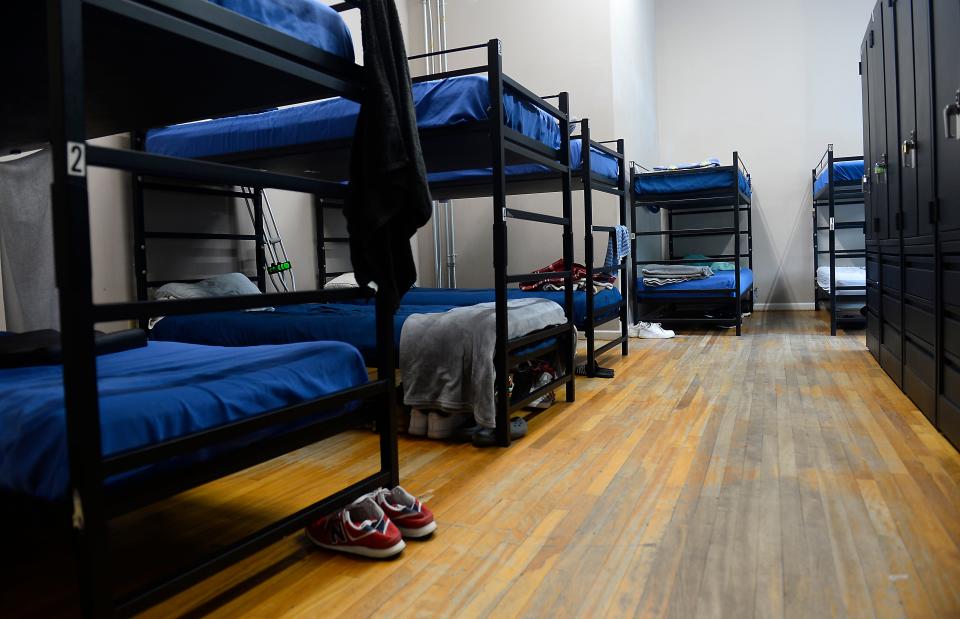
Other shelters, resources in Spartanburg, and what’s next from the city
Although shelter options have remained largely unchanged since Rutherford moved to Spartanburg in 2005, she said some transitional housing programs have since developed. Groups that aid exclusively homeless veterans, those undergoing substance issues or victims of domestic or sexual violence are also available.
H.O.P.E Ministries of the Upstate is a faith-based agency that serves “displaced individuals.” The nonprofit has a six-month Phase I program and a “family-oriented” discipleship house as Phase II.
BridgeWay Village, run by First Baptist Spartanburg, is under construction and will offer transitional housing for homeless single women. It is set to open in 2024.
Warriors Once Again is a transitional housing program that currently houses five veterans and has successfully transitioned seven since opening in 2021, according to their website.
Battle Betty, serving female veterans, provides an emergency shelter option, case management and monthly events intended to help with reintegration.
Project R.E.S.T houses victims of domestic violence and sexual assault.
GoForth Recovery offers a residential transitional living home to men battling addiction and substance abuse issues.
The Homeless Task Force is a group of service providers, nonprofits and government entities led by the city, United Way of the Piedmont, OneSpartanburg, Inc. and formerly SPIHN/The Opportunity Hub.
Rutherford and Marilyn Nguyen, Project Coordinator for the city, referenced the group’s Challenge For Change initiative, which includes a list of homeless resources.
Dig deeper: Spartanburg's Homeless Court offers what one judge calls 'justice through another lens'
According to the task force’s website, the Homeless Engagement and Response Team aims to “reduce the number of homelessness by 10%, to successfully refer at least 75% of our homeless residents to resources within Spartanburg, and to engage in at least 12 educational opportunities with the community within the next year.”
Rutherford said the latter two goals were exceeded. For reducing homelessness, she said they have seen a "significant number" of homeless individuals getting housed, but said the reduction of homelessness is hard to gauge.
"We have housed many of our homeless, but since this is a transient population, some may get housed and we are not aware of that housing, or some leave Spartanburg," Rutherford said.
The city and United Way are looking to hire a new HEART Community Resource Coordinator. Rutherford said they have interviewed applicants, and the position will remain posted until the end of July. Job duties include providing outreach, case management and supportive services to homeless individuals.
At the end of 2021, SPIHN and city officials were in discussion about another possible night shelter, Rutherford said. Rutherford said she left SPIHN while this was still on the table.
“The SPIHN committee for that concept was to create a budget for sustainability so that the city could see if this was a viable option,” Rutherford said. “It is my understanding that this was not done in a timely manner.”
Chalmers Rogland covers public safety for the Spartanburg Herald-Journal and USA Today Network. Reach him via email at crogland@gannett.com.
This article originally appeared on Herald-Journal: After Opportunity Hub closure, what shelter options in Spartanburg?

